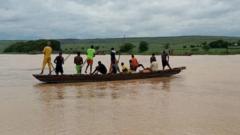The recent merger of Nigeria's foremost opposition leaders, Atiku Abubakar and Peter Obi, into a new political entity is reshaping the political landscape in the lead-up to the 2027 elections. Abubakar, formerly of the People's Democratic Party (PDP), and Obi, who was with the Labour Party (LP), have chosen the African Democratic Congress (ADC) as their platform to challenge President Bola Tinubu's ruling All Progressives Congress (APC). This alliance is viewed as one of the most significant shifts in Nigerian politics since the nation transitioned from military rule in 1999.
**Nigerian Political Landscape Shifts as Opposition Leaders Unite in New Party**

**Nigerian Political Landscape Shifts as Opposition Leaders Unite in New Party**
Nigeria's opposition figures Atiku Abubakar and Peter Obi form a coalition, igniting political excitement ahead of the 2027 election.
Both leaders previously faced electoral defeat in the 2023 elections due to a split vote—Tinubu won with just 37%, while Abubakar secured 29%, and Obi garnered 25%. Their decision to team up is a strategic effort to unify opposition votes and enhance their chances in the next election. At the ADC unveiling, interim chairman David Mark emphasized the importance of protecting Nigeria's democracy and preventing the emergence of a one-party system.
Analysts believe that both Abubakar and Obi are learning from their past experiences, realizing that collaboration could be the key to victory in 2027. Plans suggest that Abubakar, 78, may run for president again with Obi, 63, as his vice-presidential candidate. The coalition also includes other notable political figures, such as former Senate President David Mark and former key allies of Tinubu.
Experts express mixed views on the coalition's chances against Tinubu. Some analysts argue that with a joint strategy, the coalition has a better shot than before, while others caution that incumbency usually favors sitting leaders, making Tinubu a formidable candidate for re-election.
The ruling APC remains dismissive of the coalition, claiming it is not a legitimate threat to their power. Both the PDP and LP have rejected joining the ADC, opting instead to confront the APC independently. As the political narratives unfold, all eyes are on the ADC and its potential impact on Nigeria's future.
Analysts believe that both Abubakar and Obi are learning from their past experiences, realizing that collaboration could be the key to victory in 2027. Plans suggest that Abubakar, 78, may run for president again with Obi, 63, as his vice-presidential candidate. The coalition also includes other notable political figures, such as former Senate President David Mark and former key allies of Tinubu.
Experts express mixed views on the coalition's chances against Tinubu. Some analysts argue that with a joint strategy, the coalition has a better shot than before, while others caution that incumbency usually favors sitting leaders, making Tinubu a formidable candidate for re-election.
The ruling APC remains dismissive of the coalition, claiming it is not a legitimate threat to their power. Both the PDP and LP have rejected joining the ADC, opting instead to confront the APC independently. As the political narratives unfold, all eyes are on the ADC and its potential impact on Nigeria's future.



















